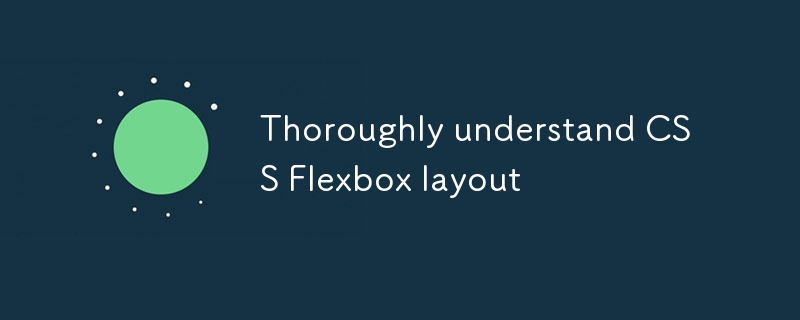Thoroughly understand CSS Flexbox layout
This article introduces Flexbox layout, which is a flexible and responsive CSS layout model. By defining key properties such as flex-direction, justify-content, and align-items, developers can control the arrangement, alignment, and size of elements to accommodate different screen sizes and devices. The article also discusses useful ways to solve common problems in Flexbox layout.

1. Thoroughly understand CSS Flexbox layout
Flexbox layout is a CSS layout pattern that allows developers to create flexible, responsive web page layouts. Using Flexbox, you can control the arrangement, alignment, and size of elements to adapt to different screen sizes and devices.
2. How to create a responsive web design using Flexbox layout?
To create a responsive web design using Flexbox, you need to define a special container and apply Flexbox properties to it. This enables Flexbox layout, allowing you to control the behavior of elements within the container. You can use properties such as flex-direction, justify-content, and align-items to determine the arrangement, alignment, and size of elements.
3. What are the different Flexbox properties and how to use them to control layout?
The following are the key properties that control Flexbox layout and their usage:
- flex-direction: Define the direction (row or column) of elements.
- justify-content: Controls the alignment of elements on the main axis (left, right, center, etc.).
- align-items: Control the alignment of elements on the cross axis (top, bottom, center, etc.).
- flex: Control the size, arrangement and growth behavior of individual elements within the container.
4. How to solve common layout problems in Flexbox layout?
Common ways to resolve common issues with Flexbox layouts include:
- Check your browser’s developer tools for issues with your layout.
- Make sure flex-direction is set correctly to arrange elements the desired way.
- Use the justify-content and align-items properties to fine-tune the alignment of elements.
- Adjust the flex property to control the behavior of individual elements.
- Clear any unnecessary whitespace and margins.
The above is the detailed content of Thoroughly understand CSS Flexbox layout. For more information, please follow other related articles on the PHP Chinese website!

Hot AI Tools

Undresser.AI Undress
AI-powered app for creating realistic nude photos

AI Clothes Remover
Online AI tool for removing clothes from photos.

Undress AI Tool
Undress images for free

Clothoff.io
AI clothes remover

AI Hentai Generator
Generate AI Hentai for free.

Hot Article

Hot Tools

Notepad++7.3.1
Easy-to-use and free code editor

SublimeText3 Chinese version
Chinese version, very easy to use

Zend Studio 13.0.1
Powerful PHP integrated development environment

Dreamweaver CS6
Visual web development tools

SublimeText3 Mac version
God-level code editing software (SublimeText3)

Hot Topics
 1377
1377
 52
52


